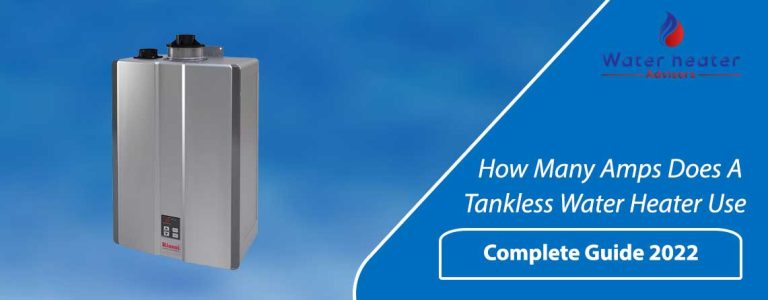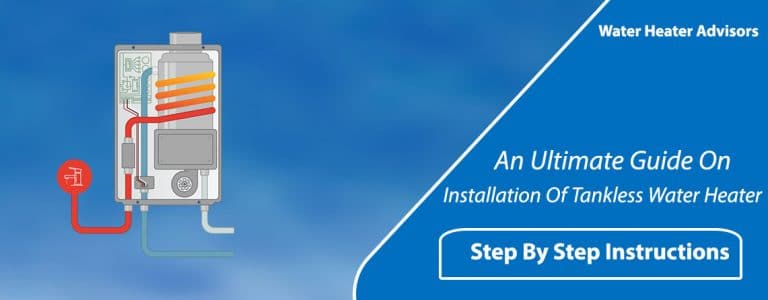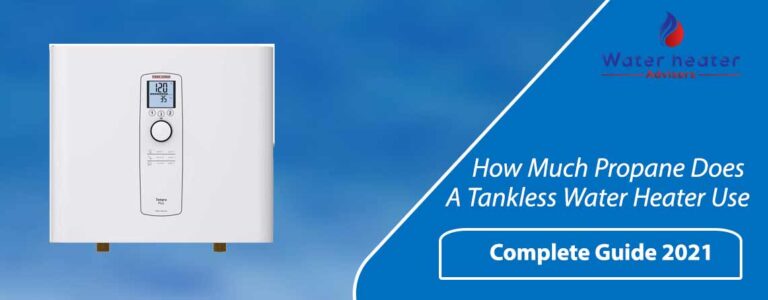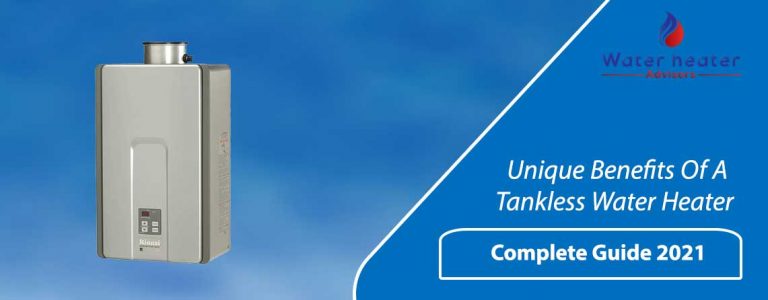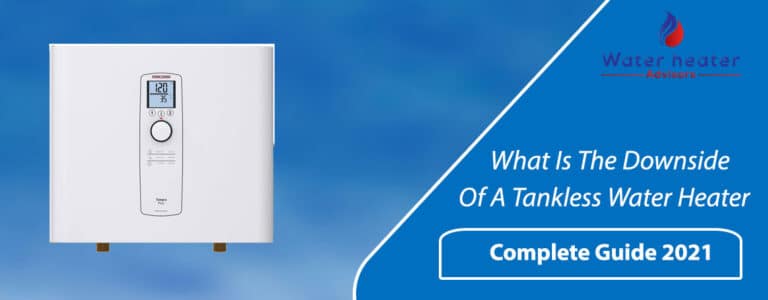How Does A Tankless Water Heater Work?
Are you tired of running out of hot water while enjoying a shower, washing dishes, or doing laundry?
There’s no need to feel annoyed anymore because nowadays, compact and ultra-efficient tankless water heaters are available that promise to provide a limitless and on-demand stream of hot water.
They are swiftly gaining popularity and for a valid reason. It is renowned as an on-demand or an instant water heater with numerous advantages over a standard heater.
However, it also has some downsides and restrictions that you should consider before deciding to make a switch.
Understanding how a tankless water heater works and its limitations can help you make a well-versed purchasing decision.
In this article, we will give you comprehensive information on what they are and how they work. Let’s begin with what they exactly are and then move on to how they work.
What Is Tankless Water Heater?
They are capable of providing warm water only when you activate them. A regular storage heater holds hot water in a boiler and utilizes power to keep it hot until needed.
It delivers only a limited amount of hot water that it has deposited and functions nonstop regardless of whether you are out of the house or asleep.
On the other hand, the tankless unit can be installed in an attic, kitchen, bathroom, closet, an exterior wall, or any other corner of the apartment or house.
It is anticipated to heat your entire house or a single point of use. You will have to deploy a separate heater for your bathroom, kitchen, and appliance with the point of use.
They give you a never-ending supply of warm water since the water is heated promptly when required. It makes a tankless heater more energy-efficient as compared to a traditional heater.
They use power only to heat water, not to reheat and stock the warm water. One of the prime reasons to use them is that a container’s size does not restrict them.
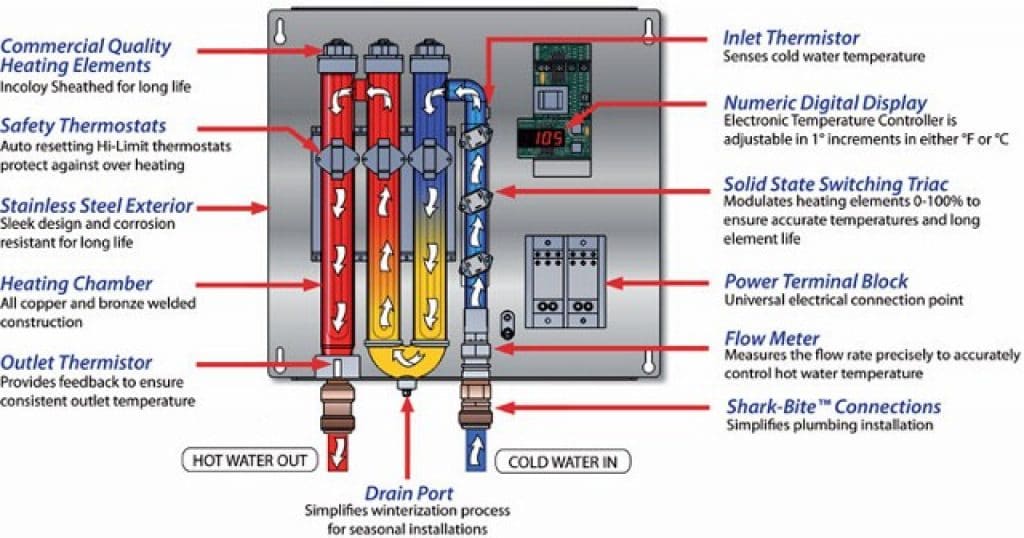
How Does A Tankless Water Heater Work?
Turn On The Hot Water Tap
The initial step of how a tankless water heater works gas is, of course, activating it. Make sure the water is moving through the pipelines without any obstructions. Now, it’s time to turn on the hot water tap.
If you are using a single knob shower valve, rotate it towards the warm water. However, if you utilize dual knobs, then detect the warm water knob and turn it on to permit the water flow through it.
Water Runs Through The Tankless Water Heater
Now, after activating the heater and turning on the tap, what should you do next? If you are using a storage-style unit, you can expect warm water to move from the container through your pipes.
However, if you are using a tankless heating system, cold water travels through the sensors that activate the internal computing system and start the heating procedure.
Sensors Detect The Water Flow
Once the internal computing system has been activated, it instantly determines how the gas or electric burners need to heat the cold water to a seamless temperature.
It delivers a constant stream of hot water with a perfect temperature, so there’s no need to wait for a long time for the unit to fill back up.
The Internal Computer Automatically ignites the Burner.
Now, you might be wondering how do a tankless water heaters work during a power outage? System’s internal computer automatically ignites the Burner.
When the Burner starts heating the water, it flows around a heat exchanger positioned inside the system until it reaches its preset temperature.
The heated water then leaves the unit and starts flowing through the pipelines until reaching its ultimate destination in your house that needs hot water.
Turn Off The Heater
It is the final phase of how does a propane tankless water heater works. The tankless systems can give nonstop hot water because they heat the water only when you need it, so there’s no worry about running out of the water while showering or washing clothes.
Once the demand for warm water has been satisfied, the unit automatically turns off and stops utilizing energy. It stays inactive until you again activate it to acquire hot water.

How Do Electric Tankless Water Heaters Work?
Many people want to buy an electric tankless heater, so they specifically want to know how it works as you know that tankless systems are known as on-demand heaters because they only start functioning when you activate them to obtain warm water.
However, this is not the case with conventional storage heaters. In the electric heater, the heating process starts when an appliance or tap is turned on. Then, the sensors detect the flow of water.
At this time, the water circulates over the electric components and heats it as it passes by. From here, the water is transferred to the fixture that needs hot water.
How Does A Tankless Water Heater Work Gas?
If you were deliberating on how a gas heater operates differently from an electric one, it’s straightforward. In the electric models, the water moves around the heated metal coils.
However, in the gas-powered models, it flows through the heat exchanger. The heat exchanger is a chain of multiple pipes that pass by the gas burners to heat the water at a preset temperature.
It does not matter if a model is powered by gas or electricity; its GPM capacity will be highly reliant on your house’s daily water requirements.
Typically, people who have installed an incorrectly sized unit in their houses question tankless heaters’ efficiency.
For example, a family of two people may only require a 5 GPM water heating unit. However, if your family consists of 7 to 8 people, you will need a 9.5 GMP capacity water heater.
Now, a question may have popped up in your head that how does a propane tankless water heater work. It functions in the same way a gas heater works.
How Do A Tankless Water Heaters Work During Power Outage?
Initially, you need to understand that they can’t operate without electricity. It’s evident that an electric heater requires power to function, but gas and propane models also need it.
They rely on an internal computing system to perceive the water flow rate. Their sensors need electricity to initiate the heating procedure. Electricity is also obligatory to keep up the heat as long as the water flows to generate steady warm water flow.
Suppose you are based in a region where power outages are frequent or require a model that functions without electricity. In that case, you should contact a professional plumber to discuss the available options.
You can deploy it by uniting it with other heating models that don’t need electricity, such as solar water heater. In some situations, the computer components can be functioned using a battery backup. It can enable a gas or propane heater to work for some time without a power source.
Major Difference Between Gas And Electric Tankless Water Heater
Gas or electric? Which one is an ideal choice? The answer to this inquiry depends on the individual needs of a household. What is best for one residence might not be a perfect fit for another.
That’s why, while buying a heater, bear in mind the specific needs of an apartment or an office. Also, check which fuel source is readily available in your locality.
Many areas don’t have ingress to gas or propane, so their residents are left with the only electricity option.
In other circumstances, your house’s current electricity supply line may not support a new electric heater without modifications.
Therefore, it’s essential to understand your home’s distinct circumstances and then look for the perfect match to satisfy all your needs for many years to come.
They are intended to last for up to 15 to 20 years. So, they are a major investment from both economic and time point of view.
If you are unable to decide which heater is right for you and how does a tankless water heater works, you can take help from a professional plumber.
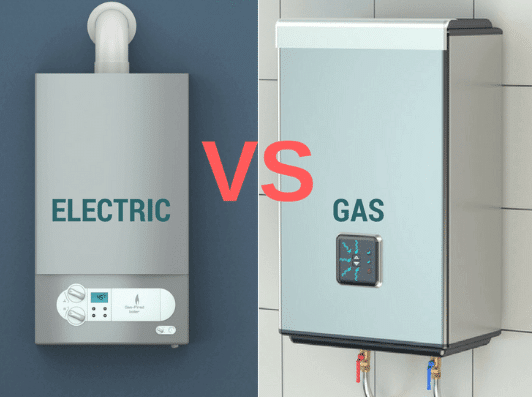
Gas VS Electric Tankless Unit
Initial Cost
Gas
- They are over-priced, so you may have to spend more than $1000 to buy a great quality model.
- Non-condensing units are cost-effective but too costly to install because of their venting needs.
- Condensing systems have a higher price tag, but they don’t require a venting system, so their deployment expenditures are quite low.
Electric
- These models are less costly as compared to gas ones. You may have to invest up to $500 on a great quality electric heater.
- Their installation expenses are higher and depend on the residence’ electricity supply situation.
Installation Requirements
Gas
- They are not only expensive but challenging to install, as well.
- If you have bought a non-condensing system, it will need a venting system made of stainless steel that will permit sufficient airflow for ignition.
- While switching from a tank to a tankless unit, the existing venting pipes will need to be replaced.
- It becomes critical to upgrade the home’s gas pipelines to support the new unit’s power demands.
- You will have to spend a massive amount on modifications to meet your new model’s gas or propane and venting necessities.
Electric
- The installation process of the electric heater is more comfortable and less costly.
- They have a smaller and compact size than the gas units.
- Just because they are smaller and more comfortable to deploy, you can mount them in any corner of the house, such as the attic, closet, kitchen, bathroom, etc.
- It doesn’t require a venting system because there’s no gas ignition taking place.
- In some situations, you may have to spend money on your house’s power upgrade.
Hot Water Requirements
Gas
- They can effortlessly provide a flow rate of 20 GPM.
- If more than 4 people live in your house, then a gas heater can be an impeccable choice to fulfill your needs.
Electric
- They can deliver up to 8 GPM.
- The groundwater temperature has a significant impact on the performance of both gas and electric models.
Operating Expenditures:
Gas
- It features an energy efficiency rate of 80 to 85%.
- The gas price is much lower than electricity, so the gas-powered units are less costly to operate.
- One imperative thing to remember is that when the gas fuel price increases, the energy costs will unquestionably rise. In this case, the electric units become inexpensive because they have a higher energy efficiency rate.
Electric
- It flaunts an energy-efficiency rate of 98 to 99%, which means you can expect to save a tremendous amount on electricity bills.
- In some regions, gas prices are higher than electricity, so electric heaters become more economical to operate.
- The impressive energy-efficiency rate of these models can dramatically decrease your overall utility expenses.
Maintenance Requirements:
Gas
- They are complex, so they require more maintenance than electric systems.
- A licensed plumber should examine the unit once a year to ensure it is working correctly.
- It’s necessary to flush it once or twice a year to prevent mineral buildup.
Electric
- It needs minimal maintenance, and you should also install a pre-filter to avoid sediment.
- If you have deployed an inlet screen filter, then frequently flush it.
- Make sure to wash the entire system every twelve months.
Service Life And Warranty:
Gas
- They are manufactured to last for up to 20 years, but regular maintenance can further increase its lifespan.
- If you do not regularly maintain it, the unit won’t function well, and its lifecycle will also decrease.
- All manufacturers offer a different warranty, but many provide 10 years heat exchanger warranty, 5 years additional components warranty, and 1-year labor warranty.
Electric
- They have the most straightforward design, so their lifespan can exceed 20 years.
- Many brands provide lifetime warranties, but some offer 5 years additional parts warranty and 1-year labor warranty.
- They are easier to troubleshoot, inspect, and repair when issues occur.
Environmental Impacts:
Gas
- They perform much better than tank heaters when we talk about energy-efficiency. In some cases, they have an energy-efficiency rate of 80%.
- Greenhouse gases are released into the environment with them.
Electric
- They have 98% to 99% energy-efficiency rates.
- It doesn’t use fossil fuels or emit greenhouse gases, so it is environment-friendly.
Fuel Source Considerations:
Gas
- Currently, gas rates are lower than electricity costs, but it may not be the case in all states or regions.
- According to experts, gas prices will rise in the coming future.
Electric
- Electricity prices are higher, so you will have to pay heavy energy bills to obtain warm water.
- They use a considerable amount of power, but you will have to upgrade your electric power supply line to accommodate the power demands required to activate the heater.
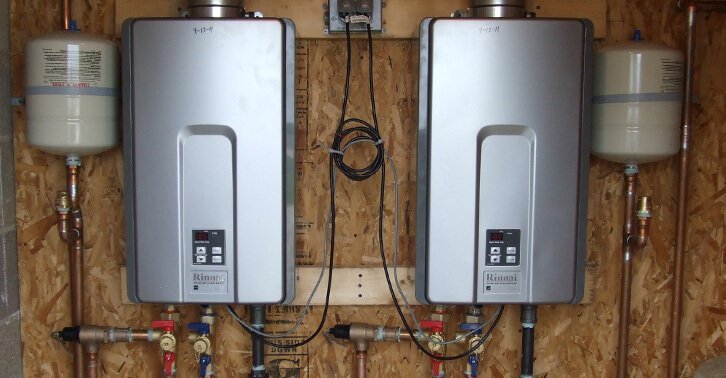
Is It Worth It To Invest Money In Tankless Heater?
Shut your eyes and visualize for a moment that you have returned home after a long tiring day’s work, and the only thing on your head is taking a long, warm, and satisfying bath and forget about your distresses.
You step into your bathroom and start enjoying the warm water splashing down upon you, but after a few minutes, you perceive the water temperature is turning ice cold and becoming a freezing torture test for you.
Well, the issue can be tracked to an underperforming conventional storage water heater. This is the primary reason why most folks are making a shift to a tankless water heater. They are learning about its benefits, disadvantages, and how fast do tankless water heaters work.
Advantages
- It gives you an unlimited amount of hot water as per your demand.
- You can acquire hot water in a few seconds instead of waiting for many hours.
- Hot water can be used for multiple showers and appliances at the same time.
- It helps you to save money in the long run, thanks to their higher energy efficiency rate.
- They have a significantly longer lifecycle than storage units.
- Tankless need less space than the traditional system.
Disadvantages
- The deployment of these models is more costly. The piping and venting system can be expensive.
- An incorrect-sized unit won’t be able to provide you desired supply of water.
- They have a higher buying cost than the standard heaters.
Conclusion:
Now, after reading our comprehensive guide on how does a tankless water heater works and what are its advantages and disadvantages, you can make an informed buying decision.
As they run more efficiently than the traditional units, so they can support you to save a substantial amount of your hard-earned money every year on energy expenses.
When you are fully prepared to purchase a water heater, make sure to pick a trusted manufacturer.


